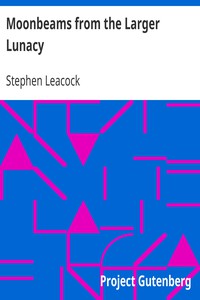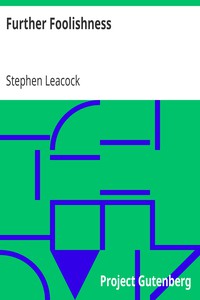Moonbeams from the Larger Lunacy, Stephen Leacock [best mobile ebook reader TXT] 📗

- Author: Stephen Leacock
Book online «Moonbeams from the Larger Lunacy, Stephen Leacock [best mobile ebook reader TXT] 📗». Author Stephen Leacock
Caxton paused and gazed at Master Nicholas in wonder. “Whence hadst thou this?”
Master Nicholas smiled.
“I had it of a chapman, or travelling doctor, who was most urgent that we set it forth straightway on the press.”
“And is it true?” asked Caxton; “thou hast it of a full surety of knowledge?”
Nicholas laughed lightly.
“True or false, I know not,” he said, “but the fellow was so curious that we should print it that he gave me two golden laurels and a new sovereign on the sole understanding that we should set it forth in print.”
There was deep silence for a moment.
“He PAYETH to have it printed!” said Caxton, deeply impressed.
“Aye,” said Master Nicholas, “he payeth and will pay more. The fellow hath other balms equally potent. All of these he would admonish, or shall I say advert, the public.”
“So,” said Caxton, thoughtfully, “he wishes to make, if I may borrow a phrase of Albertus Magnus, an advertisement of his goods.”
“Even so,” said Nicholas.
“I see,” said the Master, “he payeth us. We advert the goods. Forthwith all men buy them. Then hath he more money. He payeth us again. We advert the goods more and still he payeth us. That would seem to me, friend Nick, a mighty good busyness for us.”
“So it is,” rejoined Nicholas, “and after him others will come to advert other wares until belike a large part of our news sheet,—who knows? the whole of it, perhaps, shall be made up in the merry guise of advertisements.”
Caxton sat silent in deep thought.
“But Master Caxton”—cried the voice of a young apprentice, a mere child, as he seemed, with fair hair and blue eyes filled with the native candour of unsullied youth,—“is this tale true!”
“What sayest thou, Warwick?” said the master printer, almost sternly.
“Good master, is the tale of the wonderous balm true?”
“Boy,” said Caxton, “Master Nicholas, hath even said, we know not if it is true.”
“But didst thou not charge us,” pleaded the boy, “that all that went under our hand into the press should be truth and truth alone?”
“I did,” said Caxton thoughtfully, “but I spoke perhaps somewhat in overhaste. I see that we must here distinguish. Whether this is true or not we cannot tell. But it is PAID FOR, and that lifts it, as who should say, out of the domain of truth. The very fact that it is paid for giveth it, as it were, a new form of merit, a verity altogether its own.”
“Ay, ay,” said Nicholas, with a twinkle in his shrewd eyes, “entirely its own.”
“Indeed so,” said Caxton, “and here let us make to ourselves another and a final maxim of guidance. All things that any man will pay for, these we will print, whether true or not, for that doth not concern us. But if one cometh here with any strange tale of a remedy or aught else and wishes us to make advertisement of it and hath no money to pay for it, then shall he be cast forth out of this officina, or office, if I may call it so, neck and crop into the street. Nay, I will have me one of great strength ever at the door ready for such castings.”
A murmur of approval went round the group.
Caxton would have spoken further but at the moment the sound of a bell was heard booming in the street without.
“‘Tis the Great Bell,” said Caxton, “ringing out the hour of noon. Quick, all of you to your task. Lay me the forms on the press and speed me the work. We start here a great adventure. Mark well the maxims I have given you, and God speed our task.”
And in another hour or so, the prentice boys of the master printer were calling in the streets the sale of the first English newspaper.
XVII—IN THE GOOD TIME AFTER THE WAR
[Footnote: An extract from a London newspaper of 1916.]
HOUSE OF COMMONS REPORTThe Prime Minister in rising said that he thought the time had now come when the House might properly turn its attention again to domestic affairs. The foreign world was so tranquil that there was really nothing of importance which need be brought to the attention of the House. Members, however, would, perhaps, be glad to learn incidentally that a new and more comfortable cage had been supplied for the ex-German Emperor, and that the ex-Crown Prince was now showing distinct signs of intelligence, and was even able to eat quite quietly out of his keeper’s hand. Members would be gratified to know that at last the Hohenzollern family were able to abstain from snapping at the hand that fed them. But he would now turn to the subject of Home Rule.
Here the House was seen to yawn noticeably, and a general lack of interest was visible, especially among the Nationalist and Ulster members. A number of members were seen to rise as if about to move to the refreshment- room. Mr. John Redmond and Sir Edward Carson were seen walking arm in arm towards the door.
The Prime Minister. “Will the members kindly keep their seats? We are about to hold a discussion on Home Rule. Members will surely recall that this form of discussion was one of our favourite exercises only a year or so ago. I trust that members have not lost interest in the subject.” (General laughter among the members, and cries of “Cut it out!” “What is it?”)
The Prime Minister (with some asperity). “Members are well aware what Home Rule meant. It was a plan—or rather it was a scheme—that is to say, it was an act of parliament, or I should say a bill, in fact, Mr. Speaker, I don’t mind confessing that, not having my papers with me, I am unable to inform the House just what Home Rule was. I think, perhaps, the Ex-Minister of Munitions has a copy of last year’s bill.”
Mr. Lloyd George rising, with evident signs of boredom. “The House will excuse me. I am tired. I have been out all day aeroplaning with Mr. Churchill and Mr. Bonar Law, with a view to inspect the new national training camp. I had the Home Rule Bill with me along with the Welsh Disestablishment Bill and the Land Bill, and I am afraid that I lost the whole bally lot of them; dropped them into the sea or something. I hope





Comments (0)